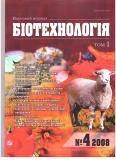ISSN 1995-5537

"Biotechnology" journal Vol. 1, No. 4, 2008
Р. 69-75, Bibliography 74, Ukrainian.
Universal Decimal classification 541.13:577.112.087
BIOLUMINESCENT BACTERIA AS SENSOR ELEMENTS FOR THE HEAVY METALS IONS’ CONTENT DETECTION
Ovcharenko Institute of Biocolloidal Chemistry of the National Academy of Sciences of Ukraine, Kyiv
It has been shown the doze-dependent inhibition influence of gold ions on Photobacterium phosphoreum В7071 (lux+) natural luminescence. These bacterial cells can serve as a sensor element for ionic gold content detection, for example, in wastewater of gold-mining and gold-processing manufactures for requirements compliance control. The Pseudomonas fragi T2(5) transconjugates, which contain hybrid plasmid (ZnRlux+) and which are capable of the high-specific of light emission as a result of the contact with zinc ions, have been derived by conjugate crossing method. It enables to use these transconjugates as sensor elements in the high-specific bioluminescent detection of qualitative and quantitative content of this metal in environmental objects.
Key words: bacteria, natural bioluminescence, induced bioluminescence, detection, gold, zinc, conjugate crossing.
© Palladin Institute of Biochemistry of National Academy of Sciences of Ukraine, 2008

